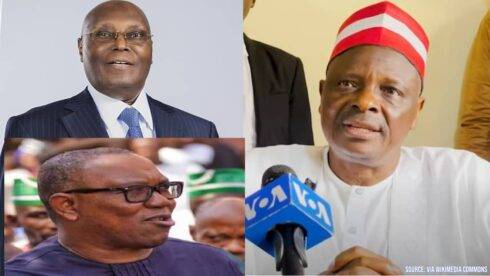Rabiu Musa Kwankwaso, leader of the New Nigeria People’s Party (NNPP), has firmly denied allegations of a secret consensus agreement involving himself, Atiku Abubakar of the People’s Democratic Party (PDP), and Peter Obi of the Labour Party. The claims suggested that a plan had been devised by 45 scholars, allocating presidential terms of four years to Atiku, another four years to Rabiu Musa Kwankwaso, and eight years to Obi. Dismissing the reports as unfounded, Kwankwaso labeled them as deliberate attempts to mislead the public and create unnecessary political tension.
In a strongly worded statement, Rabiu Musa Kwankwaso emphasized his commitment to political transparency and rejected what he called “political fabrications.” He clarified that no such agreement exists and expressed concern about the spread of misinformation in Nigeria’s political landscape. By addressing the issue head-on, Rabiu Musa Kwankwaso demonstrated his resolve to protect his political integrity and focus on the critical issues facing the nation. His rebuttal serves as a reminder of the need for accountability and fact-checking in political discourse.
The Alleged Rotational Presidency Plan
The alleged arrangement reportedly involved 45 scholars mediating a pact where Atiku would serve as president for four years, followed by Kwankwaso for another four, and Obi for eight years. This supposed consensus plan has sparked widespread speculation about secret deals among Nigeria’s political elite.
Rabiu Musa Kwankwaso dismissed the narrative as an orchestrated attempt to derail his political ambitions. Rabiu Musa Kwankwaso insisted that he had no such agreement with Atiku, Obi, or any scholars. Rabiu Musa Kwankwaso’s rejection of the claims highlights a commitment to transparency and independence in his political journey.
PDP’s Role Under Scrutiny
The People’s Democratic Party (PDP) has been accused of orchestrating the alleged consensus plan, raising questions about the party’s role in the controversy. While the PDP has not issued an official response, the allegations have drawn significant attention from political observers and the public alike.
Analysts suggest the PDP may face credibility challenges if it fails to address the matter decisively. Rabiu Musa Kwankwaso’s pointed remarks against the PDP’s alleged involvement have amplified the party’s need to clarify its position and reaffirm its commitment to democratic values.
Silence from Peter Obi and Labour Party
Peter Obi, the Labour Party’s presidential flagbearer, has so far remained silent on the allegations. His party, which prides itself on advocating progressive governance, has also refrained from issuing a statement, leaving room for speculation.
The Labour Party’s silence has led to questions about its strategy in handling politically sensitive issues. Some critics argue that the party must take a stand to maintain its credibility, while others believe it is waiting for more clarity before addressing the matter.
Analysts Decry Lack of Transparency
Political analysts have criticized the alleged consensus plan as a blow to Nigeria’s democratic principles. They argue that the idea of prearranged leadership agreements undermines the integrity of the electoral process and disenfranchises voters.
“This claim, whether true or false, shifts attention from critical issues facing Nigeria,” one analyst noted. “Instead of discussing solutions to insecurity, unemployment, and corruption, we’re debating an alleged backroom deal.” This sentiment reflects growing frustration with distractions in Nigeria’s political discourse.
Rabiu Musa Kwankwaso’s Call for Focus on Real Issues
In his rebuttal, Rabiu Musa Kwankwaso urged Nigerians to focus on critical national issues rather than be swayed by baseless rumors. He outlined his vision for the country, emphasizing education reform, infrastructure development, and economic empowerment as his key priorities.
Rabiu Musa Kwankwaso’s decisive response may bolster his image as a principled leader, unafraid to confront political propaganda. As Nigeria approaches another election cycle, the controversy underscores the need for greater accountability and transparency in the nation’s political arena.
Table of Contents
Discover more from OGM News NG
Subscribe to get the latest posts sent to your email.














